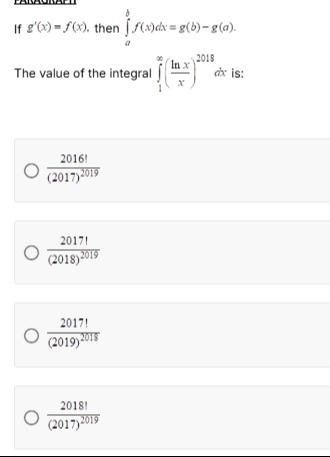Question
Question: If g'(x)=f(x), then $\int_{a}^{b} f(x)dx = g(b)-g(a)$. The value of the integral $\int_{1}^{\infty}...
If g'(x)=f(x), then ∫abf(x)dx=g(b)−g(a).
The value of the integral ∫1∞(xlnx)2018dx is:

201720182018!
201820182017!
201720192017!
201720192018!
201720192018!
Solution
Let the integral be I. We are asked to evaluate I=∫1∞(xlnx)2018dx. Let n=2018. The integral is I=∫1∞(xlnx)ndx. We use the substitution u=lnx. This implies x=eu and dx=eudu. When x=1, u=ln1=0. As x→∞, u→∞. Substituting these into the integral, we get: I=∫0∞(euu)neudu=∫0∞enuuneudu=∫0∞une−(n−1)udu.
Now, let v=(n−1)u. This implies u=n−1v and du=n−11dv. The limits of integration remain 0 to ∞. Substituting these into the integral: I=∫0∞(n−1v)ne−vn−11dv I=∫0∞(n−1)nvne−vn−11dv I=(n−1)n(n−1)1∫0∞vne−vdv I=(n−1)n+11∫0∞vne−vdv.
The integral ∫0∞vne−vdv is the Gamma function Γ(n+1). For a positive integer n, Γ(n+1)=n!. Therefore, I=(n−1)n+11⋅n!=(n−1)n+1n!.
In this problem, n=2018. Substituting n=2018: I=(2018−1)2018+12018!=201720192018!.
